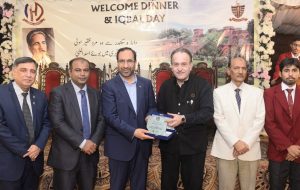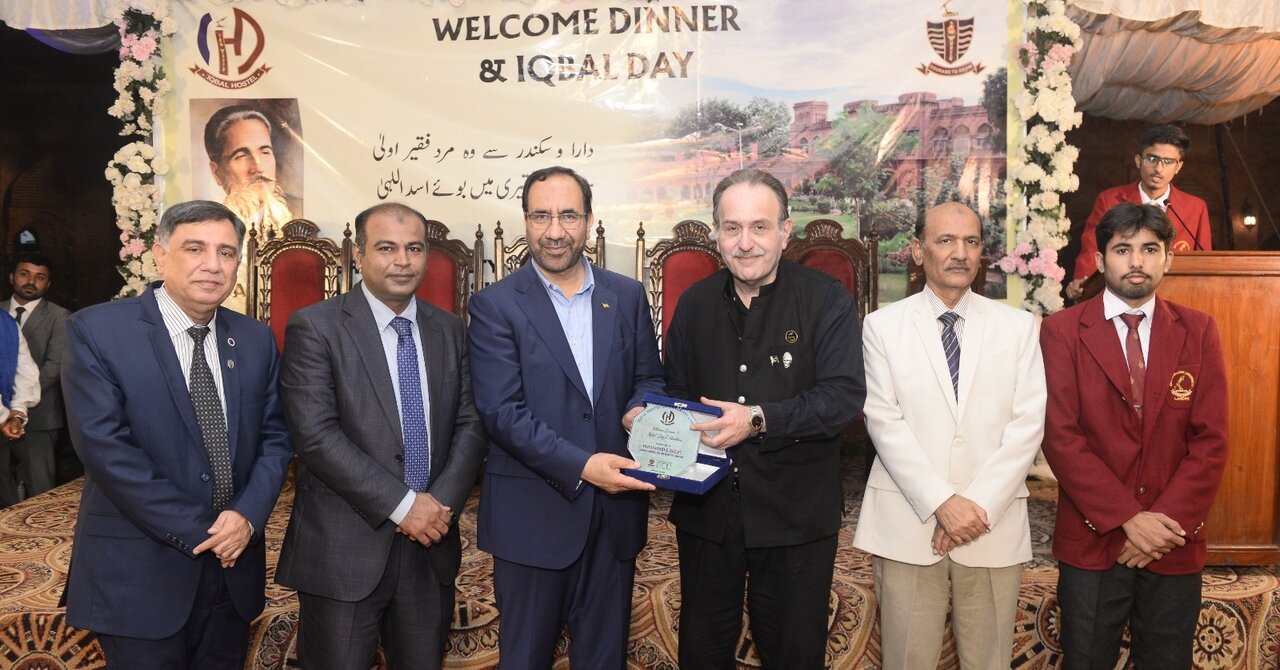Allama Muhammad Iqbal commemorated in Lahore, Tehran
TEHRAN-On the occasion of the 147th birthday of poet Allama Muhammad Iqbal, commemoration ceremonies were held in Iran and Pakistan. A ceremony was organized on November 10 at the GC University Lahore, where the head of Iran Culture Center in Lahore Asghar Masoudi and Muneeb Iqbal, the grandson of Allama Iqbal attended, ISNA reported. Through


TEHRAN-On the occasion of the 147th birthday of poet Allama Muhammad Iqbal, commemoration ceremonies were held in Iran and Pakistan.
A ceremony was organized on November 10 at the GC University Lahore, where the head of Iran Culture Center in Lahore Asghar Masoudi and Muneeb Iqbal, the grandson of Allama Iqbal attended, ISNA reported.
Through the event, the thoughts and ideas of the great poet were highlighted and a commitment was made to keep his message alive in the new generations.
Masoudi described Persian as the language of love and the modern Islamic civilization, noting that it serves as a suitable medium to convey the profound and elevated thoughts of Iqbal. “In his works, love for the Prophet Muhammad (PBUH) and the Ahl al-Bayt (the Prophet’s family) is evident,” he noted.
Reading some of Iqbal’s poetry, Masoudi noted that Iqbal Lahori was a multifaceted personality, with each aspect of his life worthy of its own book. “Iqbal was a philosopher, poet, mystic, Islamic scholar, politician, and prominent social reformer who chose Persian as the vehicle for expressing his ideas,” he added.
He further mentioned that, years before the 1979 Islamic Revolution in Iran, Iqbal had predicted this revolution and the emergence of Imam Khomeini (RA). “In one of his poems, he described Iran at that time as a prison with high walls, prophesying that a great man would come and break the chains,” Masoudi stated.
For his part, Muneeb Iqbal emphasized the influence of Allama Iqbal’s poetry and ideas on the younger generation and his special attention to youth. “Iqbal consistently addressed the youth as his primary audience, urging them to value high human and spiritual ideals. For Iqbal, this issue was so important that he harbored the hope of establishing an independent Islamic country for Muslims, where they could live freely, honorably, and securely practice their beliefs,” he said.
Muneeb noted that Iqbal’s love and devotion to Prophet Muhammad (PBUH) and the Ahl al-Bayt are clearly reflected in his poetry. “In many verses, Iqbal refers to the Prophet as a symbol and a perfect role model for Muslims. This love and reverence for the Prophet and Ahl al-Bayt reflect Iqbal’s deep faith in Islam and adherence to its principles,” he added.
At the end of the ceremony, Muneeb Iqbal presented a commemorative plaque to Asghar Masoudi, recognizing his efforts in promoting Persian culture and language and commemorating Iqbal’s legacy.
The plaque symbolized appreciation and respect for Masoudi’s valuable services in strengthening cultural ties between Iran and Pakistan and expanding Iqbal’s teachings among the younger generation.
Iran Culture Center in Lahore is one of the 85 cultural delegations of the Islamic Culture and Relation Organization in the world, established in 1956 based on the cultural agreement between Iran and Pakistan.
In another ceremony at the University of Tehran on November 12, the Ambassador of Pakistan in Tehran Muhammad Mudassir Tipu said: “It is a matter of pride for us that the leader of the Islamic Revolution not only gives great importance to the poems of Allama Iqbal, but he has also memorized 2,000 poems of Iqbal”.
“Allama Muhammad Iqbal has said about Iran and Pakistan that we are not just border neighbors but we have ancient cultural, historical, and civilizational relations with Iran,” he noted.
“To strengthen friendship and foster further cooperation, agreements have been made, one of which includes establishing a chair for Urdu language and Pakistan studies in the Faculty of Literature at the University of Tehran. The Urdu language department was initially established in 1991 in the Faculty of Foreign Languages at the University of Tehran, and now it has also been set up in the Faculty of Literature. We hope, with the support of our dear friends at the University of Tehran, these activities will continue with strength,” the ambassador added.
Muhammad Iqbal (1877–1938), widely known as Allama Iqbal, was a South Asian academic, poet, barrister, philosopher, and politician who is considered one of the most important figures in Urdu literature, with literary works in both Urdu and Persian languages.
Iqbal is admired as a prominent classical poet in Iran, Pakistan, India, Bangladesh, Sri Lanka and also by international scholars of literature.
He is widely known as the poet of Islam or the poet of the East. However, about 60 percent of the works of Iqbal are in the Persian language which makes him equally popular in Iran. His poetry has been translated into many languages.
Though Iqbal is best known as an eminent poet, he is also a highly acclaimed Muslim philosophical thinker of modern times. He is called the spiritual father of Pakistan.
He was a strong proponent of the political and spiritual revival of Islamic civilization across the world, but in particular in South Asia; a series of lectures he delivered to this effect were published as “The Reconstruction of Religious Thought in Islam”.
After the creation of Pakistan in 1947, he was named the national poet there. He is also known as the “Hakeem-ul-Ummat” (The Sage of the Ummah) and the “Mufakkir-e-Pakistan” (The Thinker of Pakistan).
SS/SAB
